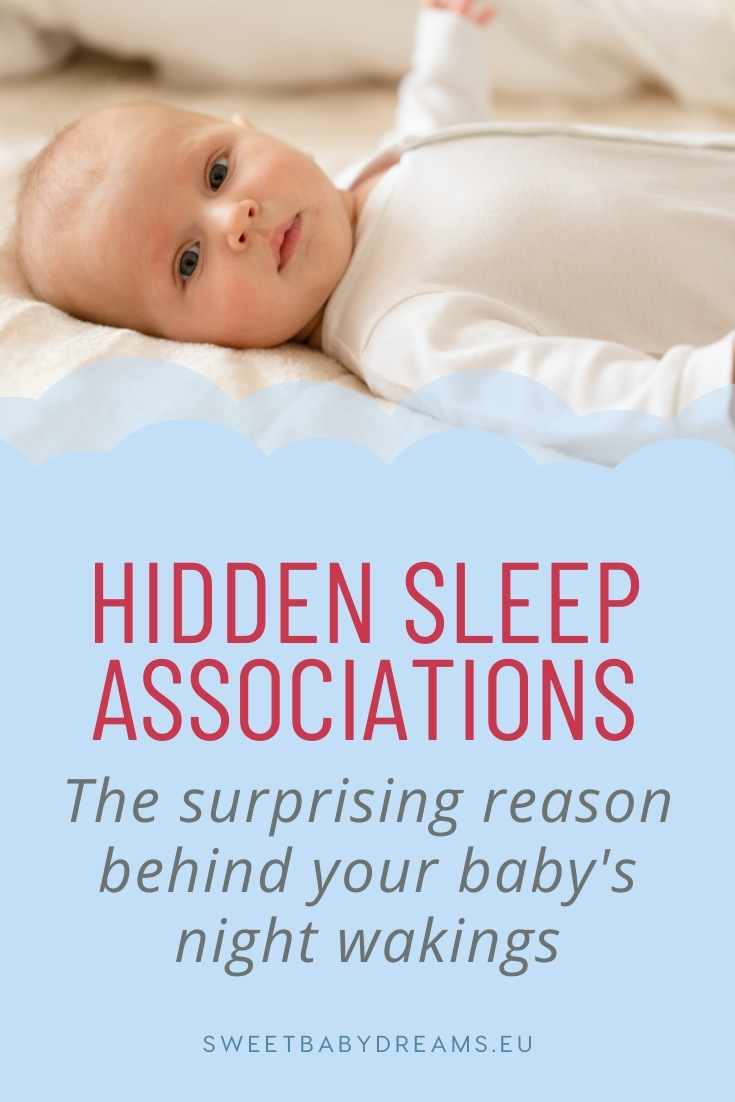Here’s a question about night wakings we hear a lot in coaching – “Our baby falls asleep completely on their own and in their own bed, but still wakes up every hour or two demanding to be fed. Are they REALLY just SO hungry?”
Unless your baby is less than 4 weeks old, the answer is definitely NO. So, why is it that they wake so frequently? After all, they are completely able to self settle!
Our usual follow-up question here is – when is the baby’s last feed before bedtime? And 9 times out of 10 the answer is – just a few minutes before they go to bed.
And BOOM! That’s where the problem lies. If your baby eats just before you cosy them up in their bed for the night (there is no difference between nursing or bottle feeding here) and then wakes frequently during the night, the main problem (amongst other possible ones) usually is that they have a hidden sleep association.

What is a “hidden” sleep association?
Just to back up a little, when we talk about sleep associations we are usually talking about the way a baby falls asleep at the beginning of the night. Sleep associations often cause issues because the baby requires the same help in the middle of the night, as they did when falling to sleep at bedtime (rocking, feeding, etc). However, the baby can seemingly fall asleep unaided.
So, what’s the problem??
This is a case of a “hidden sleep association” at work, one of the most missed causes of frequent night waking we see in our coaching work. Even though the baby is relatively awake when they are put into bed, the milk they consumed just a few minutes before actually serves to maintain the association between feeding and falling asleep. This connection between feeding and falling asleep is preventing the baby from being able to independently connect sleep cycles in the night.
Most common hidden sleep associations:
- Feeding close to bedtime/nap time
- Parent’s presence during settling
- Constantly helping baby to get back down from a standing position or changing baby’s position (such as turning or head positioning, especially if it lasts more than 1-2 weeks and baby clearly has the skills to do it themselves)
How to reduce night wakings?
Basically, we need to slowly break the connection or disassociate the problem behaviour from sleep.
How to do this when a feeding is too close to bedtime?
The easiest thing to do is to make sure there’s at least 30min between finishing your baby’s last feed and putting them into bed for the night. That means that between feeding and falling asleep you’ve also created an ideal space for a bedtime ritual. You might turn down the lights, close the curtains, give your little one a few minutes of play-time on the floor or snuggle on the rocking chair with a couple of board books, sing a song, or brush your little one’s teeth. This kind of ritual not only serves as a good sleepy cue to help your little one know it’s almost bedtime, but it also creates some space in between feeding and sleep.
What to do if your child wants you to lay with them until they fall asleep?
If your child’s hidden sleep association is requiring your presence in the room to fall asleep, there are gradual methods of sleep training that can help you slowly remove yourself from the room so that your baby can eventually fall asleep independently.
How to break the cycle of helping your child lay down?
If you’re stuck in a game of constantly needing to help your baby lay down from a standing position, set a realistic goal for yourself. You might only help them lay down twice per bedtime, and otherwise encourage them to do it themselves by patting the mattress and speaking calmly to them, explaining what you want them to do.
Keep in mind that some babies might still hold on to the hidden sleep association in the middle of the night, even if the baby is truly self-settling at bedtime. In that case it could be helpful to use a gentle sleep training method to reduce night wakings/feedings. Please note that I said reduce, not wean completely! Depending on your little one’s age they may still actually need a feed or two in the night. Not to mention that it IS possible to maintain a long-term breastfeeding relationship, even if you remove the nursing right-before-sleep association and reduce/wean night feeds!
Did you recognize any hidden associations your baby might have? If you did and feel like you want more support in making changes to your child’s sleep patterns, book a free virtual consultation call with us to hear more about how we can help.
